Related Research Articles

American Automobile Association is a federation of motor clubs throughout North America. AAA is a privately held not-for-profit national member association and service organization with over 60 million members in the United States and Canada. AAA provides services to its members, including roadside assistance and others. Its national headquarters are in Heathrow, Florida.

The European Automobile Manufacturers Association is the main lobbying and standards group of the automobile industry in the European Union. In February 1991 it became the successor of the CCMC manufacturers committee which was founded in October 1972.
The National Highway Traffic Safety Administration is an agency of the U.S. federal government, part of the Department of Transportation. It describes its mission as "Save lives, prevent injuries, reduce vehicle-related crashes" related to transportation safety in the United States.
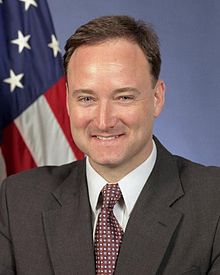
Brigham A. McCown is a former member of the U.S. Senior Executive Service at the United States Department of Transportation. He served as chief executive of (2020-2022) the Alyeska Pipeline Service Company which designed, built, operates, and maintains the Trans-Alaska Pipeline System. Following retirement from federal service, he worked as an attorney, consultant, and was a Clinical Professor at Miami University.
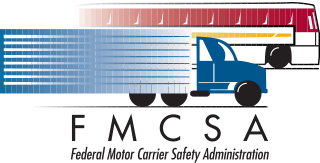
The Federal Motor Carrier Safety Administration (FMCSA) is an agency in the United States Department of Transportation that regulates the trucking industry in the United States. The primary mission of the FMCSA is to reduce crashes, injuries and fatalities involving large trucks and buses.
The Auto Alliance (AAM) is a defunct trade group of automobile manufacturers that operated in the United States. It was the leading advocacy group for the auto industry, representing 77% of all car and light truck sales in the United States. The Auto Alliance was active in the areas of environment, energy and motor vehicle safety. In 2019, the Alliance was merged with the Association of Global Automakers to form the Alliance for Automotive Innovation. John Bozzella of Global Automakers became the new CEO.

The National Automobile Dealers Association (NADA) is an American trade organization representing nearly 16,500 franchised new car and truck dealerships, both domestic and foreign. Established in 1917, the organization is based in Tysons Corner, Virginia. As the automotive retail industry's primary trade association, NADA monitors federal legislation and regulation affecting dealerships and publishes forecasts and reports about industry trends. American Truck Dealers, established in 1970, is a division of NADA representing nearly 1,800 heavy- and medium-duty truck dealerships throughout the United States.
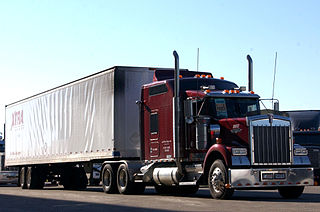
The trucking industry serves the American economy by transporting large quantities of raw materials, works in process, and finished goods over land—typically from manufacturing plants to retail distribution centers. Trucks are also used in the construction industry, two of which require dump trucks and portable concrete mixers to move the large amounts of rocks, dirt, concrete, and other building materials used in construction. Trucks in America are responsible for the majority of freight movement over land and are tools in the manufacturing, transportation, and warehousing industries.
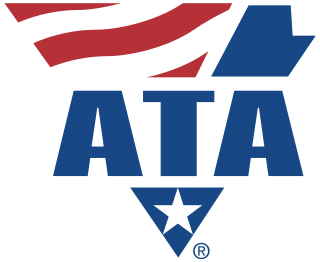
The American Trucking Associations (ATA), founded in 1933, is the largest national trade association for the trucking industry. ATA represents more than 37,000 members covering every type of motor carrier in the United States through a federation of other trucking groups, industry-related conferences, and its 50 affiliated state trucking associations. Former Governor of Kansas Bill Graves was replaced by Chris Spear as the ATA's president and CEO in July 2016.

The trucking industry in the United States has affected the political and economic history of the United States in the 20th century. Before the invention of automobiles, most freight was moved by train or horse-drawn vehicle.
The Surface and Air Transportation Program Extension Act of 2011 became a United States law when President Barack Obama signed the Act on September 16, 2011 (Public Law No. 112-30. The law extends taxes which fund federal highway expenditures through March and the Federal Aviation Administration through January. The Surface and Air Transportation Programs Extension Act of 2011 is a direct result of an agreement which was reached by the House and Senate majority leaders. This extension act was a top priority to Congress because federal highway and FAA funding was about to expire.

The Alliance for Automotive Innovation is a Washington, D.C.-based trade association and lobby group whose members include international automobile and light duty truck manufacturers that build and sell products in the United States. In 2019, the Global Automakers merged with the Alliance of Automobile Manufacturers and became the Alliance for Automotive Innovation.

The Eno Center for Transportation is a non-profit, independent organization based in Washington, D.C. with a mission to shape public debate on critical multimodal transportation issues and builds an innovative network of transportation professionals. The Center was created and endowed in Westport, Connecticut, by William Phelps Eno, a pioneer in the field of traffic control.
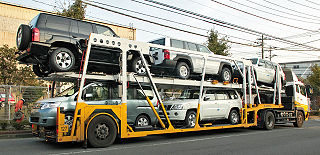
An auto transport broker is a type of cargo broker that specializes in the shipping and transportation of vehicles. Most vehicles shipped in the U.S. are cars and trucks, but many brokers handle boats, RVs, motorcycles and other types of vehicles as well. Auto transport is classified as "specialized freight trucking" under NAICS code 484230.

Public Law 113-45 is an American Act of Congress which requires that the Federal Motor Carrier Safety Administration go through the standard rulemaking proceeding, allowing comment from the public and the trucking industry, before it sets any requirements for truck drivers related to sleep apnea. It was introduced in the United States House of Representatives during the 113th United States Congress and was signed into law by President Barack Obama in October 2013.
America’s Infrastructure Alliance (AIA) is national 501(c)(4) representing transportation companies in the United States. Its stated mission is lobbying for increased federal investment in the national transportation system. The group is made up of representatives from transportation and construction industry companies and trade groups, Airlines for America, American Trucking Association, Association of American Railroads and Associated General Contractors.
Environmental Action is a 501(c)(4) non-profit environmental advocacy organization in the United States. Founded in 1970 by environmental activists at the first Earth Day, it operated until 1996 but was then rebooted in 2012 as part of the Public Interest Network, a family of non-profit organizations that includes the Public Interest Research Group, Environment America, Green Corps and others.
The Commercial Vehicle Safety Alliance (CVSA) is a non-profit association of local, state, provincial, territorial and federal commercial motor vehicle safety officials and industry representatives. CVSA focuses on improving driver and vehicle safety by providing guidance to organizations that enforce commercial motor vehicle inspections and certify inspectors, and reports over 4,000 members in the United States, Canada and Mexico.
The highway lobby, also known as the "road gang", "motordom", or the “highwaymen”, is a collective of industry interests that advocate for an automobile-centric society. It is made up of corporate interests representing the automobile, oil, construction, rubber, asphalt, trucking, and limestone industries. The term is often used as a pejorative by those who accuse this broad interest group of "Asphalt Socialism", or those who accuse the lobby of nefarious actions. The highway revolts, the Highway Action Coalition, pedestrian movements, and many other modern civil society organizations, are a response to this lobby. One example of the highway lobby is the American Highway Users Alliance that represents its interests. The highway lobby exists in many countries, for example the US, France, Italy through the group "Friends of the Automobile" or Malaysia.

On November 8, 2016, Illinois voters approved the Illinois Transportation Taxes and Fees Lockbox Amendment, a legislatively referred constitutional amendment that prohibits lawmakers from using transportation funds for anything other than their stated purpose.
References
- 1 2 Historical Milestones, 1932 Alfred P. Sloan, Jr., then president of General Motors, and other industry leaders founded the National Highway Users Conference (NHUC) to work for good, all-weather roads in every state to “get the farmers out of the mud” and to protect highway funding sources from depression-born demands for new tax revenues.
- 1 2 "Return of Organization Exempt from Income Tax (IRS Form 990)" (PDF). American Highway Users Alliance. 2007.
{{cite journal}}: Cite journal requires|journal=(help) - ↑ Historical Milestones The Highway Users and its predecessors have been instrumental in the passage of virtually all major highway and traffic safety legislation over the past 75 year
- ↑ "Norman Mineta, Former Transportation Secretary, to be 2007 Commencement Speaker". ucla. Archived from the original on 2010-12-24. Retrieved 2010-10-28.
- ↑ "U.S. Secretary of Transportation Norman Y. Mineta Joins Hill & Knowlton". Hill & Knowlton. 2006. Archived from the original on 2006-07-17. Retrieved 2010-10-28.
- ↑ "Bill Graves, ATA President & CEO". American Trucking Associations. Archived from the original on 2011-01-02. Retrieved 2010-10-28.
- ↑ "Testonomy of Thomas F Jensen" (PDF). Archived from the original (PDF) on 2014-09-08. Retrieved 2011-09-02.
- ↑ "ROY E. LITTLEFIELD, Ph.D." Retrieved 2010-10-28.
- ↑ "Greg Cohen". LinkedIn. Retrieved 2010-10-28.
Greg Cohen’s Summary Licensed Professional Engineer Registered lobbyist - federal govt. & Congress Greg Cohen’s Specialties: Lobbying, media relations, grassroots organization, association management. Professional Staff House T&I Committee (Transportation/Trucking/Railroad industry) 2000 — 2002
- 1 2 3 Historical Milestones page 1
- ↑ Historical Milestones, The Highway Users Federation was formed by the merger of the Automotive Safety Foundation (ASF), National Highway Users Conference (NHUC), and the Auto Industries Highway Safety Committee
- ↑ Historical Milestones,Under the leadership of then President and CEO William D. Fay, The Highway Users was reorganized and dedicated to more successful and aggressive issue advocacy on behalf of the highway community.
- ↑ Dauncey, Guy; Mazza, Patrick (2001-01-01). Stormy weather: 101 solutions to global climate change . New Society Publishers. p. 174. ISBN 0-86571-421-5.
American Highway Users Alliance global climate coalition.
- ↑ "What Other Industries Are Saying About the Waxman-Markey Climate Bill". National Petrochemical & Refiners Association. Archived from the original on 2011-02-06.
From a June 24, 2009 Legislative Alert issued by the American Highway Users Alliance (emphasis added): “The Waxman-Markey cap-and-trade bill will dramatically raise the price of highway fuel through a hidden tax on the carbon present in the fuel. The Congressional Budget Office (CBO) estimates that this bill will raise the price of gasoline by 77 cents over the next decade. And unlike a traditional fuel tax increase, none of the revenue raised will be spent on highways.”
- Sources
- Historical Milestones (PDF). Archived from the original (PDF) on 2008-05-15.